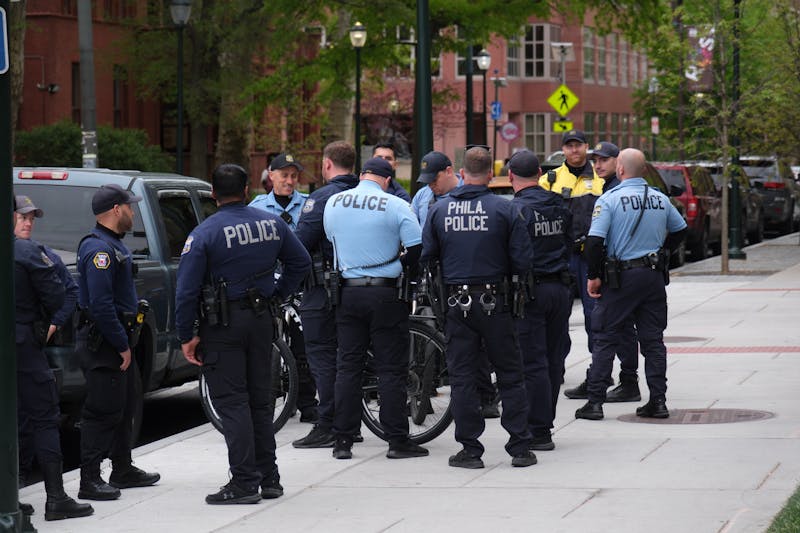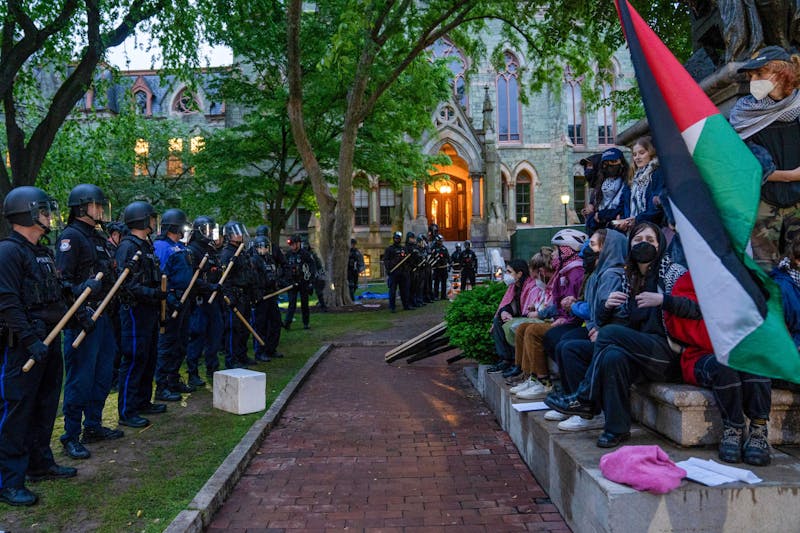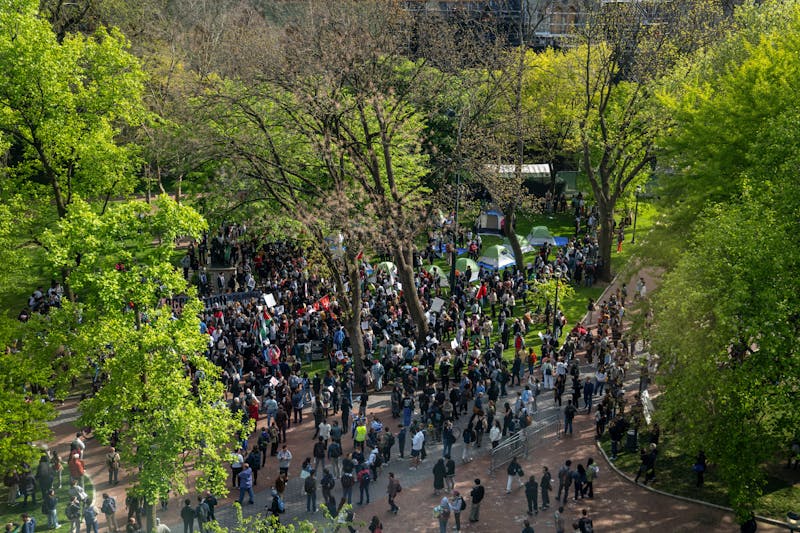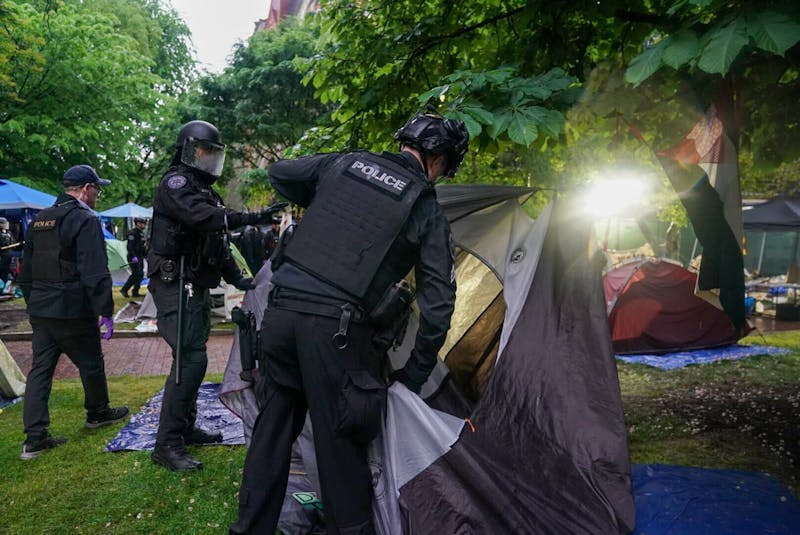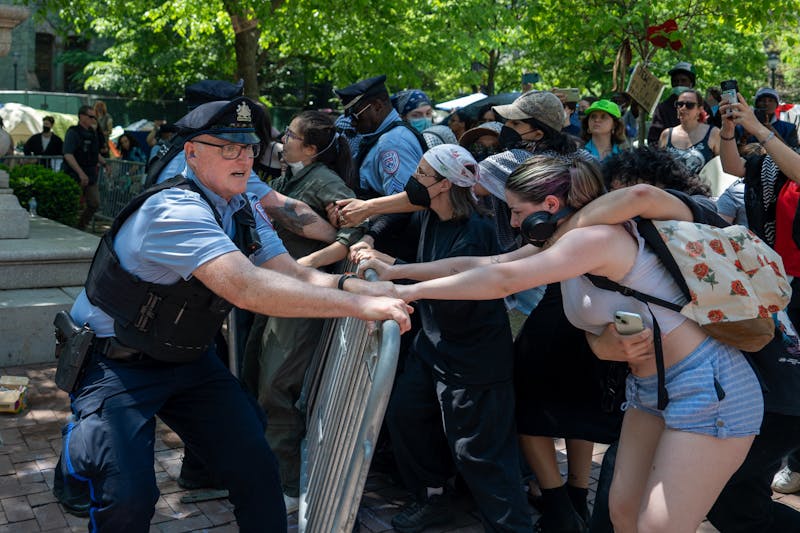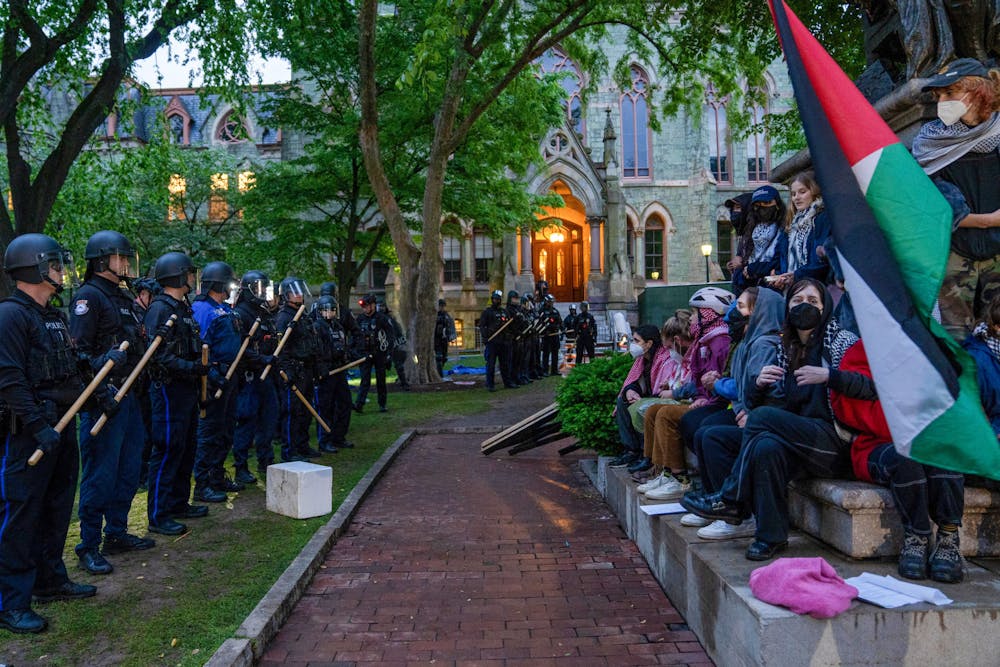
On April 25, pro-Palestinian demonstrators rushed onto College Green, marking the beginning of Penn’s 16-day-long Gaza Solidarity Encampment to protest the University’s ties to the war in Gaza.
The encampment was met with opposition and threats of disciplinary action from Penn's administration throughout its duration, as well as flared tensions with pro-Israeli counterprotesters and Jewish community members. It also included programming such as speaker events, movie screenings, and poetry readings. Ultimately, early in the morning on May 10, more than 100 Penn Police and Philadelphia Police Department officers swept the encampment — arresting 33 members, including nine Penn students, and dismantling it.
Here’s a look back at the 16 days of the Gaza Solidarity Encampment and how it may continue to affect campus, even after its disbandment.
How the encampment started
Penn revoked Penn Students Against the Occupation of Palestine’s status as a student organization on April 19. A month prior, The Daily Pennsylvanian reported that the University’s Center for Community Standards and Accountability was investigating the pro-Palestinian group.
Campus tensions were already rising when a referendum petition circulated by Penn’s Muslim Students' Association on April 24 — which asked, among other questions, whether Penn should divest from companies with ties to Israel — gathered the 500 signatures necessary to be sent to the undergraduate student body on April 26. In response, the Penn Israel Public Affairs Committee proposed its own referendum on April 25.
A protest organized by the Philly Palestine Coalition started at 2 p.m. at City Hall on April 25, and made its way to University City and eventually Penn’s campus, where Interim Penn President Larry Jameson and Provost John Jackson Jr. were hosting a community listening session at Perry World House. The protest met with a faculty walkout at 4 p.m. in front of the Split Button, and the encampment — with around 20 tents — was set up on College Green shortly after 4:30 p.m.
The encampment demanded that Penn divest from "corporations that profit from Israel’s war on Gaza and occupation in Palestine,” disclose its financial holdings under the Associated Investments Fund, and defend Palestinian students — including by withdrawing its disciplinary actions against pro-Palestinian activists and reinstating PAO.
The encampment continues
On the second day of the encampment, Jameson issued a statement to the Penn community, in which he said that Penn is "closely monitoring the encampment" and pledged “follow-up action as appropriate.” Members of the Jewish Student Advisory Board met with Penn administrators that day to detail alleged instances of harassment from encampment members, though they did not explicitly seek the end of the encampment.
That evening, Jameson sent another email urging the encampment to disband “immediately,” citing “blatant violations of University policy.” He listed several violations, including instances of harassment and vandalism.
Throughout its duration, the encampment hosted several prominent speakers, including a former member of the MOVE movement, the founder of Students for Justice in Palestine, imprisoned political activist Mumia Abu-Jamal, professor and activist Marc Lamont Hill, and Rutgers University professor Noura Erakat.
The encampment was often met with groups of pro-Israeli counterprotesters who demonstrated across from it.
There were several notable instances of physical threats to the encampment, including a pro-Israeli instigator who entered an event with a knife holster and was given a citation by police. In another incident, Penn’s Division of Public Safety detained a man who walked through the encampment spraying an “odorous substance” on May 1. Encampment members also reported multiple instances of harassment by counterprotesters in early morning hours and involving Islamophobic rhetoric and invocations of violence.
In the following weeks, Jameson and Jackson met multiple times with members of the encampment for negotiations. Protesters were faced with threats of arrest and disciplinary action, including during a fire marshal sweep, threats of identification checks, and two separate waves of disciplinary action that saw disciplinary cases and leaves of absence against encampment members.
On May 2, the DP reported that Penn requested immediate help from PPD to disband the encampment. Penn Police and PPD maintained a steady presence throughout the duration of the encampment. PPD presence was especially large on May 8, when the encampment expanded to the other side of College Green after negotiations allegedly stalled.
Arrests and the aftermath
Around 6 a.m. on May 10, Penn Police — assisted by around 100 Philadelphia Police officers — moved in to sweep the Gaza Solidarity Encampment. Protesters did not resist arrest. Police concluded arrests of 33 people, nine of whom were Penn students, after approximately an hour, at which point they were taken to a PPD station, processed, and released.
Immediately following arrests, Penn employees cleared the encampment. Jameson defended the sweep, writing in an email to the Penn community that it was an “unfortunate but necessary step.”
Faculty Senate Chair Tulia Falleti resigned her position that day, saying she was “no longer confident” she could work productively with Penn administration. She retains her role as a political science professor.
A protest that evening marched through University City, where some protesters entered the President's House on 38th and Walnut streets and participated in a “primal scream” before ending at 33rd and Market streets near Drexel University’s campus. At least four demonstrators briefly entered the gates of the residence, and at least one knocked on the door.
Community reactions
Some members of Penn’s Jewish community expressed opposition to the encampment, citing concerns about Jewish student safety and a desire for peaceful dialogue. Jewish community members presented their concerns about harassment and intimidation at the encampment in meetings with administrators and in multiple petitions, which received over 3,000 signatures and were sent to Jameson.
Several Penn-affiliated and Philadelphia organizations expressed support for demonstrators throughout the encampment — both for their cause and for their First Amendment right to protest. Penn’s chapter of the American Association of University Professors released multiple statements regarding the encampment, in which they opposed violent action and condemned the arrests.
The disbandment of the encampment garnered mixed reactions, with some condemning the University’s response while others commended Penn for “taking decisive action" in the face of alleged safety concerns.
Multiple politicians — including Penn’s representatives on the city and state levels — visited the Gaza Solidarity Encampment throughout its roughly two weeks on College Green.
On the first night, multiple state representatives, including 2013 Engineering graduate and state Rep. Rick Krajewski (D-Philadelphia), who represents Penn, visited the encampment. They expressed their support for the demonstration and emphasized that they hoped it would remain peaceful.
Philadelphia District Attorney Larry Krasner and Philadelphia City Councilmember Jamie Gauthier also visited the encampment. Krajewski and Gauthier — who also represents Penn and received a master’s in city planning from the Stuart Weitzman School of Design in 2004 — expressed their frustrations at being unable to speak with Jameson despite multiple attempts to reach him, which Gauthier called “unusual and concerning.”
Describing what he said were violations of the law and the rules, Pennsylvania Gov. Josh Shapiro called for Penn to disband the "out of control" encampment on May 9, and praised the University when it did so — a sentiment echoed by Sen. Bob Casey (D-Pa.).
Disruptions of University business
Several end-of-year celebrations originally set to take place on College Green changed their locations due to the encampment.
U-Night, a sophomore tradition normally held on College Green, was relocated to the high rise field, while Final Toast — a celebration of the senior class — was relocated to Shoemaker Green. Hey Day, one of Penn’s biggest traditions that commemorates the rising senior class, was moved to take place in Annenberg Plaza. Its customary procession down Locust Walk was shifted such that it would conclude before reaching the encampment.
Immediately after the encampment was dismantled, College Green was fenced off — cutting off a major throughway across campus and complicating access to several buildings, including Van Pelt-Dietrich Library and Fisher Fine Arts Library. The fences remain up as of publication time, and notices of trespass are attached to the fences. It is unclear when the barricades will be removed.
Penn also implemented "added security" for this year's commencement, including airport-style security checks and a no-bag policy, and removed details about the student procession.
The Daily Pennsylvanian is an independent, student-run newspaper. Please consider making a donation to support the coverage that shapes the University. Your generosity ensures a future of strong journalism at Penn.
Donate







